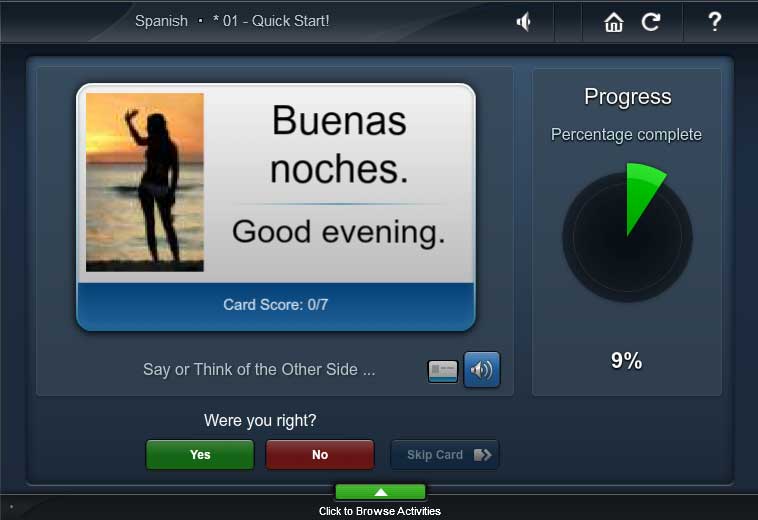Byki makes the flash card experience more fun
Byki (stands for “Before You Know It,”) is a free (premium version available) language-learning application. The software uses a clever combination of animated flash cards and robust gamification, which involves the learner in a multi-sensory vocabulary-building experience.
Download the free version of the application after choosing from an array of 67 languages — Afrikaans to Zulu — and start right in with the basics of situational vocabulary learning, common phrases, asking directions, etc. The gamification element is what makes experience especially unique:
Flash Cards
Students who need to memorize terms — vocabulary, definitions, etc. — know the value of flash cards. You write the term on one side of the card and its definition or translation on the other. Byki starts with animated, pop-up flash cards, shuffles them and displays them for learning drills:
Step 1 – You preview the cards, both sides. Your vocabulary is broken into distinct groups of cards. You just view and study them.
Step 2 – You begin self-testing by seeing the foreign word, press the “Flash Card” button and see the translation. Percentage meters for the step and for the vocabulary list track your progress as you report your frequency of correct answers. Whatever you report as incorrect shows up in increasing frequency as the program flashes additional flash cards during that session.
Step 3 – You run through Step 2, but this time you enter the response from your keyboard. This step is relatively easy when translating from the foreign language to English, but gets rather challenging as the process is reversed.
Gamified Exercises
Once you have mastered the vocabulary list through extensive flash card drills, Byki takes you through an array of reinforcement and some interesting matching games. The latter includes games called “Concentration” and “Four Square.”
Concentration consists two groups of nine hidden terms with the English vocabulary terms on the left and hidden matching foreign terms on the right. It’s a simple matching game with two levels of challenge: knowing which cards match and remembering their position. Four Square has fewer cards to match, but the goal is the same.
Finally, the “Word Whirl” offers an almost Zen-like review experience where selected groups of words float in a cloud array, stop and present both sides of the flash card terms. As they pause you hear a sound recording in English and the selected foreign language.
Byki is a great example of how gamification reinforces and makes learning fun. Whatever your learning style, the flash cards and self-testing combine with progress tracking and time-tested ways of teaching that makes this gamification-rich application worth downloading.










This looks really intriguing. As a language teacher, the question that always pops up for me when looking at tools such as these is how limited the “free” version might be and what benefits (if any) there would be in purchasing a license or an account to delve further.
Used in tandem with face-to-face interaction (i.e. a real-life way to truly measure whether a student has effectively learned the content), I think there could be some interesting classroom possibilities here.
Thanks for the post!
Thanks for the comment Barbara!
I agree — the limitations with free products do really determine how great they are as tools but in the end — they are tools! How you ultimately use them with some creative savvy can make for some awesome experiences on a budget. In any case – I would recommend you check out DuoLinguo in one of our recent posts since it is a completely free app!
http://www.gamification.co/2013/06/21/duolingo-develops-your-language-learning-skill-tree-for-free/
I have used the full version of BYKI for a few years now. The language teacher’s reservations on the potential limitations of the free version are valid. The BYKI free download doesn’t do too much, except run a limited number of flash cards by the student, but it does whet the appetite for the full version.
The above description omits the fact that the gamification features — concentration and matching — do not come with the free version. Also, you have to buy the premium version to add or customize your own vocabulary lists.
So BYKI’s main strength — teaching and reinforcing — somewhat overcomes it’s main weakness: It’s not a good reference or easily accessible word or phrase list. Also, you need to keep the individual lists topical and short, or else you’ll be subjected to lengthy and mind-numbing exercises that go on an on.
If I were to use the application in a language class, I’d do short card lists to reinforce vocabulary and grammar review. I would definitely use the premium version.